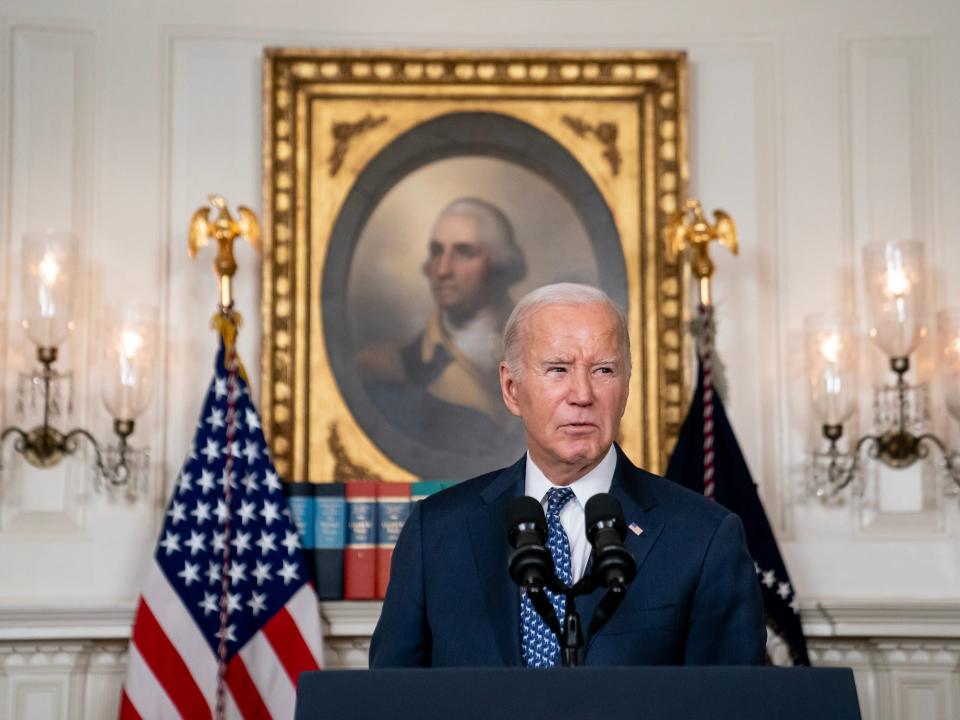-
Israel’s war in Gaza — and US support for it — has become a major issue in the 2024 election.
-
Some voters are threatening to stay home or cast protest votes over Biden’s handling of the issue.
-
But Trump would likely be even more supportive of Israel if he gets a second term.
Israel’s ongoing war in Gaza — and President Joe Biden’s continued support for it — has become a major issue in the 2024 election.
After Hamas killed more than 1,200 people in its October 7 attack, Israel launched a counteroffensive aimed at eliminating the group.
That’s led to the deaths of over 35,000 Palestinians, mass displacement and looming famine in the Gaza strip, and an international investigation into whether Israel is committing genocide.
Here’s a guide to where President Joe Biden and former President Donald Trump stand on Israel — and why some are threatening to stay home or cast protest votes in November.
Where Joe Biden stands on Israel
In general, Biden has remained staunchly supportive of Israel as it has waged its war in Gaza — but over time, he’s gradually pushed the country to change its tack in the war.
His administration has pushed for a six-week cease-fire, conditioned upon Hamas agreeing to release the remaining Israeli hostages.
In February, he described Israel’s conduct in the war as being “over the top,” and one month later, he announced the establishment of a temporary port in Gaza while urging Israel to do more to allow the passage of humanitarian aid into the besieged territory.
In March, the US abstained from voting on a UN Security Council resolution calling for an immediate cease-fire and the release of hostages, allowing it to pass — though the administration quickly downplayed the significance of that vote.

In May, his administration halted the shipment of some weapons to Israel amid concerns about the impending invasion of Rafah, a city in southern Gaza where hundreds of thousands of Palestinians have sought refuge. He also threatened to halt further shipments of offensive weapons if a large-scale invasion proceeds, though he has insisted that he will continue to supply the country with defensive weapons.
Yet the Biden administration has also cut off US funding to the United Nations Relief and Works Agency, the primary source of humanitarian aid in Gaza, over concerns that members of the organization may have been involved in the October 7 attacks.
Where Donald Trump stands on Israel
Trump, the all-but-certain GOP nominee for president in 2024, has been somewhat murky on the present conflict, criticizing Israel numerous times over the optics of the war.
“I think Israel made a very big mistake,” he told Israel Hayom in March. “These photos and shots. I mean, moving shots of bombs being dropped into buildings in Gaza… it’s a very bad picture for the world.”
At the same time, Trump said in that same interview that Israel should “go and do what you have to do” and that “you have to finish up, you have to get the job done.”


As president, Trump was even closer with Israel than Biden is, and he took several steps that benefited the Jewish state, including relocating the US embassy from Tel Aviv to Jerusalem. His administration also recognized the Golan Heights — a disputed territory claimed by Syria — as part of Israel.
Trump has also said numerous times that any Jewish person who votes for Biden or other Democrats should “have their head examined” — a missive that many have found offensive, but that signals he would be more staunchly supportive of the country than Biden.
The former president has also reportedly pledged to deport pro-Palestinian protestors on college campuses.
“If you get me reelected, we’re going to set that movement back 25 or 30 years,” Trump told a group of Jewish donors in May, according to the Washington Post.
Why some voters might cast protest voters — or stay at home
Given that Trump is broadly more supportive of Israel, one might expect voters who are concerned about Israel’s war in Gaza to vote for Biden.
That’s especially true given that many of the most vocal opponents of Biden’s Israel stance are Arab and Muslim Americans, who have long been a scapegoat for Trump’s brand of politics. Trump has also made vague pledges to expand upon the so-called “Muslim ban” that he enacted when he was president.
But many voters aren’t doing that.
Hundreds of thousands of voters who might otherwise support Biden have cast “uncommitted” ballots in Democratic presidential primaries this year in protest of his handling of the conflict.
While a solid chunk of those voters are likely to vote for Biden in the general election anyway, many say they’re still waiting to see Biden change course.
Some are even saying it’s too late — that Biden has supported what they consider to be a genocide, and that there’s no way they can vote for him again.
For these voters — some of whom may have even had family members killed in Gaza — they argue that the war outweighs all other considerations.
Abdullah Hammoud, the mayor of the predominantly-Arab city of Dearborn in Michigan, told Business Insider in March that even though he believes Biden has been a “transformative” president in terms of his domestic agenda, some of his constituents will never vote for Biden now.
“A genocide outweighs all of this,” said Hammoud. “Aiding, abetting, defending, and supporting a genocide outweighs all that transformative legislation.”
Rather than cast votes for Biden or Trump, these voters may simply stay home, or cast so-called “protest” votes for third-party candidates who have no chance of winning, such as Green Party candidate Jill Stein or independent candidate Cornel West.
Read the original article on Business Insider


